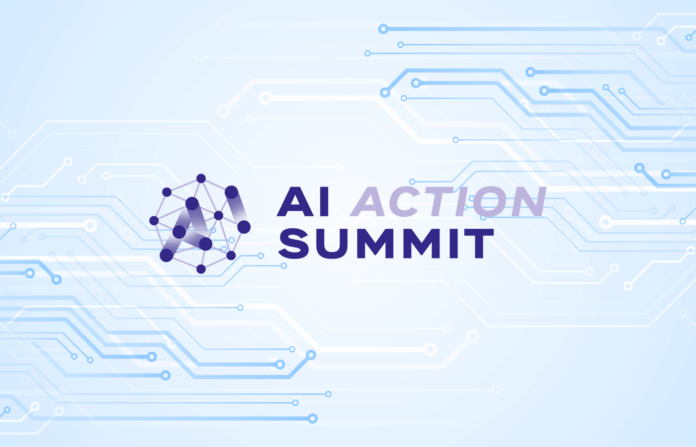At the Grand Palais, leaders from nearly 100 countries convened with tech giants such as Google, Meta, and OpenAI for the Paris Artificial Intelligence Action Summit. Co-hosted by French President Emmanuel Macron and India’s Prime Minister Narendra Modi, the event sought to shape the future of AI governance. However, contrasting positions emerged over regulatory approaches, inclusivity, and national interests.
The U.S. and U.K. declined to sign an AI declaration backed by 61 nations, while China promoted collaboration and shared advancements. Europe focused on major AI investments, and a new coalition introduced open-source AI tools for online child protection.
eWeek breaks down the four significant outcomes from the summit.
1. U.S. and U.K. refused to sign a declaration on “inclusive and sustainable” AI
Neither the U.S. nor U.K. was among the 61 countries that signed the non-binding communiqué committing to “inclusive and sustainable” AI.
U.S. President Trump criticised diversity, equity, and inclusion (DEI) initiatives, and tech companies have been scaling back DEI commitments. Given this climate, it is unsurprising that Vice President J.D. Vance refused to “pledge to foster inclusive AI,” as laid out in the declaration. Vance also said Europe was leveraging “excessive regulation” and that the U.S., the so-called “leader in AI,” was disinclined to cooperate with China, a co-signatory.
His words stood in contrast to other sentiments expressed at the summit, which centred on regulating AI for the public interest. “We need these rules for AI to move forward,” Macron said, according to the BBC.
The U.K.’s Minister for Communities, Alex Norris, denied on Sky News that the U.K.’s refusal to sign the declaration was to side with the U.S. Instead, a government spokesperson instead cited concerns about national security and “global governance” in a statement to the BBC.
This decision contrasts with the U.K.’s previous pro-safety stance — the nation hosted the world’s first AI Safety Summit in 2023. However, since then, Prime Minister Keir Starmer, who did not attend the Paris summit, has prioritised innovation in the U.K.’s AI Action Plan which put innovation front and centre and scarcely mentioned safety.
2. China expresses willingness to share AI achievements
Chinese Vice Premier Zhang Guoqing said that the country is “willing to work with other countries to promote development, safeguard security, and share achievements in the field of artificial intelligence,” according to Xinhua press agency.
China also reaffirmed its broader diplomatic stance, stating that it aims to “jointly build a community with a shared future for mankind,” echoing the core sentiment of President Xi Jinping’s diplomatic policy. In a separate discussion with President Macron, Zhang added that China is ready to work specifically with France to advance responsible AI initiatives.
3. Europe commits to significant AI investments
Europe announced several rounds of financial investment to support AI development in the region. European Commission President Ursula von der Leyen launched InvestAI, an initiative that aims to mobilise €200 billion for this purpose, including €20 billion earmarked for four AI gigafactories that will train large, complex models.
In addition, a coalition of over 60 European companies, led by venture capitalist General Catalyst, announced the EU AI Champions Initiative. It aims to accelerate AI adoption among industries by investing €150 billion in AI-related businesses and infrastructure in Europe over the next five years. The initiative also calls for simplified AI regulations to enhance innovation while maintaining safeguards.
These came on the heels of President Macron announcing that private investors will pour €100 billion into France’s AI projects over the coming years. The move is widely seen as a counterbalance to the U.S. Stargate initiative, which will allocate over $500 billion in AI infrastructure.
Macron also introduced Current AI, a non-profit initiative backed by $400 million in investments from entities including the French government, Google, and philanthropic organisations. These projects will focus on health, linguistic diversity, science, and trust and safety to support “large-scale initiatives that serve the public interest.”
4. Online safety tools to be made freely available
At the summit, Google, OpenAI, Roblox, and Discord launched a new child safety coalition, the Robust Open Online Safety Tools (ROOST) initiative. It aims to provide companies with free, open-source AI tools to help detect, review, and report child sexual abuse material.
So far, ROOST has raised over $27 million in funding. According to former Google CEO Eric Schmidt, a founding partner, the initiative will start by developing a platform focused on child protection.
